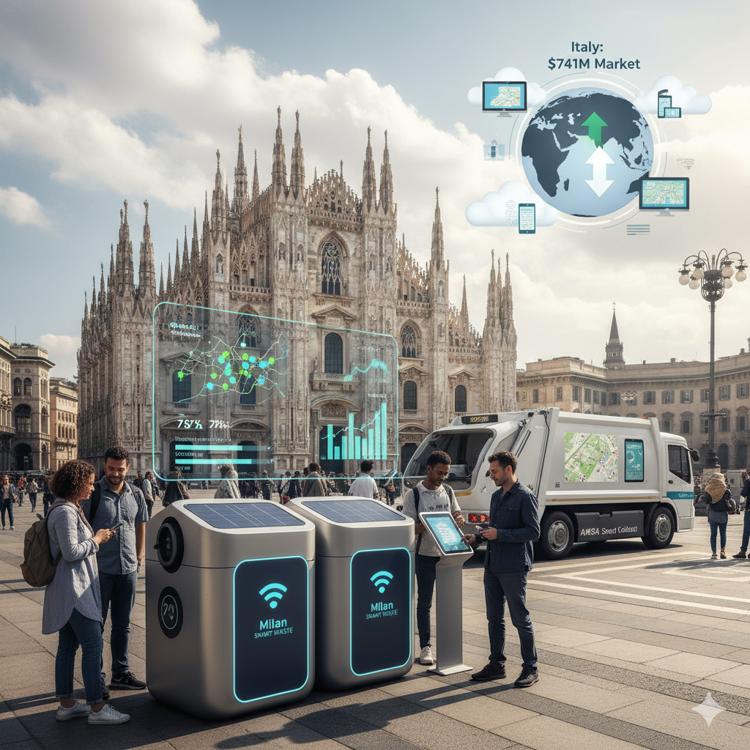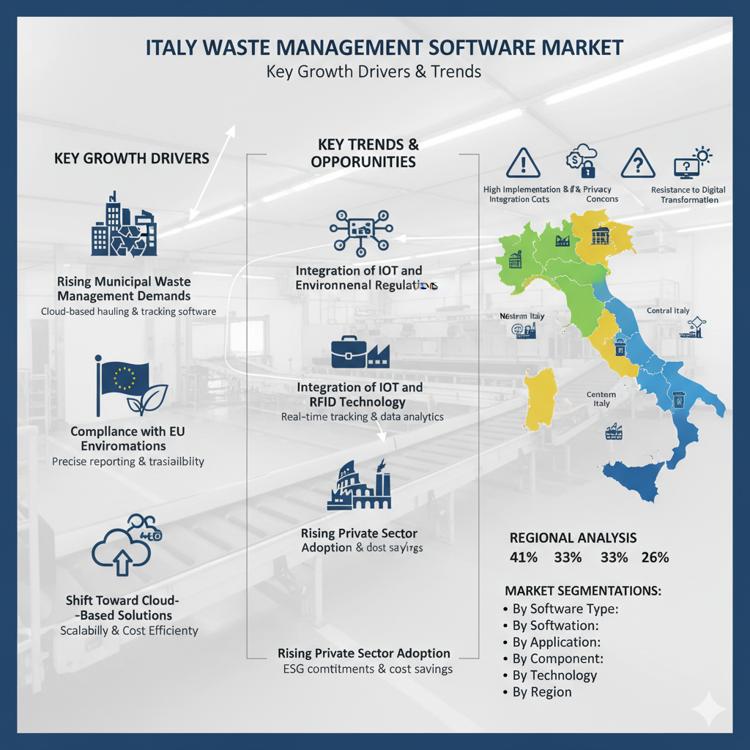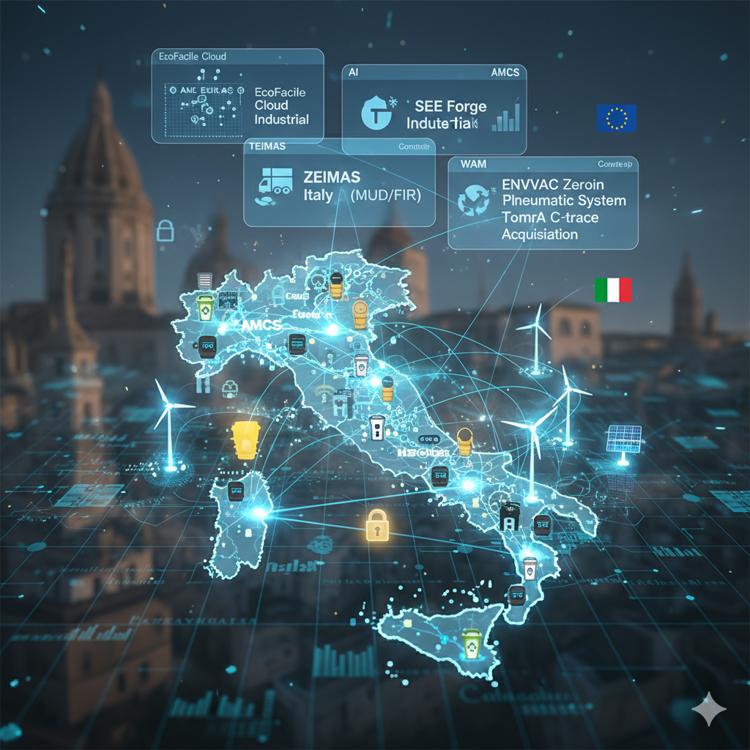Will Cloud-Based and IoT Solutions Drive Efficiency in Italy’s $741 Million Waste Management Market?

Introduction
Italy's waste management sector is undergoing a significant transformation, driven by the adoption of cloud-based platforms and Internet of Things (IoT) technologies. These innovations are reshaping how municipalities and enterprises approach waste collection, recycling, and sustainability. With the market projected to reach USD 741.01 million by 2032, understanding the role of these technologies is crucial for stakeholders aiming to enhance operational efficiency and environmental outcomes.
The Rise of Cloud-Based and IoT Solutions in Italy
Cloud-Based Platforms: Scalability and Real-Time Data Access
Cloud computing offers waste management entities the flexibility to scale operations without significant infrastructure investments. Municipalities can access real-time data on waste collection, recycling rates, and operational performance from any location, facilitating informed decision-making and efficient resource allocation.
IoT Technologies: Enhancing Operational Efficiency
IoT devices, such as smart bins equipped with sensors, provide real-time information on waste levels, enabling optimized collection schedules and reducing unnecessary pickups. This not only cuts operational costs but also minimizes environmental impact by reducing fuel consumption and emissions.
Case Studies: Implementing Smart Waste Management in Italy
Milan: A Leader in Smart Waste Management
Milan has been at the forefront of integrating IoT technologies into its waste management systems. The city utilizes smart bins that communicate fill levels to waste collection services, allowing for optimized routes and schedules. This approach has led to reduced operational costs and improved service delivery.
Alessandria: Embracing Solar-Powered Smart Bins
Alessandria has installed solar-powered smart bins as part of its commitment to sustainability. These bins not only compact waste to increase capacity but also communicate with waste management systems to optimize collection schedules, contributing to both environmental and operational efficiencies.
Lucca: Implementing RFID Technology for Waste Tracking
Lucca has adopted Radio Frequency Identification (RFID) technology to monitor waste collection and ensure compliance with recycling regulations. This system provides detailed data on waste generation and disposal, aiding in policy enforcement and public awareness initiatives.
Source: https://www.credenceresearch.com/report/italy-waste-management-software-market
Market Dynamics: Growth Drivers and Challenges
Drivers of Growth
- Regulatory Support: The Italian government's commitment to sustainability and circular economy principles has led to policies that encourage the adoption of smart waste management technologies.
- Public-Private Partnerships: Collaborations between municipalities and private companies have facilitated the deployment of advanced waste management solutions.
- Technological Advancements: Continuous improvements in IoT devices and cloud platforms have enhanced the capabilities and affordability of smart waste management systems.
Challenges
- Integration with Legacy Systems: Many municipalities operate on outdated infrastructure, posing challenges in integrating new technologies.
- Data Privacy Concerns: The collection and analysis of vast amounts of data raise issues related to data security and privacy.
- High Initial Costs: The upfront investment required for implementing smart waste management systems can be a barrier for some municipalities.
Future Outlook: The Path Forward
The adoption of cloud-based and IoT solutions in Italy's waste management sector is expected to continue growing, driven by technological advancements and supportive policies. Future developments may include the integration of artificial intelligence for predictive analytics, further enhancing operational efficiency and sustainability.
Key Growth Drivers
1. Rising Municipal Waste Management Demands
Municipalities remain the largest application segment, driven by the growth of urban populations and increased waste volumes. Cities require digital tools for efficient waste hauling, route optimization, and collection management, while maintaining compliance with EU recycling and landfill reduction targets. Cloud-based hauling and tracking software provide scalable solutions, enabling real-time monitoring, predictive planning, and cost-efficient operations.
Example: Moovegreen Srl launched a platform that allows Italian companies to monitor annual waste generation and calculate sustainability KPIs for ESG reporting, highlighting the growing intersection of municipal oversight and corporate responsibility.
2. Compliance With EU Environmental Regulations
Italy’s waste management practices are influenced heavily by EU directives on recycling, emissions, and landfill reduction. Software solutions that enable accurate reporting, traceability, and automated compliance reduce the risk of penalties for municipalities and private enterprises. The increasing focus on circular economy principles strengthens demand for tracking and recycling modules, ensuring that digital platforms align with EU environmental and sustainability standards.
Example: Enel X expanded its Circular Economy Platform to Italian municipalities, providing real-time dashboards for recycling rates and CO₂ savings, demonstrating alignment with European Green Deal goals.
3. Shift Toward Cloud-Based Solutions
The cloud segment dominates the market, driven by Italy’s digital transformation initiatives. Cloud deployment provides scalability, cost efficiency, and integration capabilities with IoT sensors, enabling municipalities and enterprises to monitor operations in real-time across multiple locations. Cloud solutions also facilitate cross-site coordination, predictive analytics, and enhanced accessibility, accelerating the adoption of waste management software nationwide.
Key Trends & Opportunities
1. Integration of IoT and RFID Technology
IoT and RFID technologies are revolutionizing waste management. Smart bins, sensors, and connected devices allow real-time tracking of waste levels, route optimization, and emissions reduction. Integration with AI-powered platforms enables predictive maintenance, efficient scheduling, and smart city initiatives.
Example: Partitalia showcased a system using real-time bin monitoring and collection scheduling, demonstrating the operational efficiency achievable through IoT integration.
2. Rising Private Sector Adoption
Beyond municipalities, the private sector is increasingly adopting digital waste management tools, particularly in retail, manufacturing, and healthcare. Companies are integrating recycling, compliance, and hazardous waste management modules to meet sustainability goals and ESG reporting requirements.
Example: Ferrero Group partnered with SAP’s Responsible Design and Production software, enabling the company to manage packaging compliance data while supporting Italy’s national recycling targets.
Key Challenges
1. High Implementation and Integration Costs
While benefits are clear, high upfront costs for software implementation and integration remain a major barrier. Small and medium enterprises often face budget constraints, and training staff or integrating new systems with existing infrastructure can delay adoption. Vendors offering subscription-based or modular solutions can help reduce financial barriers and expand adoption among cost-sensitive organizations.
2. Data Security and Privacy Concerns
Cloud-based adoption raises concerns about data security and regulatory compliance, particularly for municipalities and healthcare facilities handling sensitive information. Ensuring robust cybersecurity, encryption, and GDPR compliance is essential to build trust in digital solutions and enable wider adoption.
3. Resistance to Digital Transformation
Cultural and organizational resistance hinders the adoption of advanced software. Many traditional operators still rely on manual processes and may lack digital literacy or understanding of the ROI of modern systems. Awareness campaigns, pilot programs, and technical support services are necessary to overcome reluctance and encourage a broader digital shift.
Regional Analysis
1. Northern Italy
Northern Italy accounted for 41% share in 2024, led by cities like Milan, Turin, and Bologna. The region benefits from advanced municipal infrastructure, industrial presence, and smart city initiatives, driving strong adoption of cloud-based and IoT-enabled platforms. Enterprises in manufacturing and retail are increasingly using compliance and recycling modules to align with EU directives. High municipal budgets and partnerships with technology vendors further fuel growth.
2. Central Italy
Central Italy contributed 33% of the market, with Rome and Florence leading adoption. Dense urban populations necessitate efficient waste tracking and recycling systems, while retail and healthcare sectors leverage compliance software. Investment in cloud-based scalable platforms and public-private collaborations sustains steady growth.
3. Southern Italy
Southern Italy held 26% share, influenced by ongoing infrastructure modernization. Cities such as Naples and Bari are adopting waste hauling and tracking software to modernize operations, although budgetary constraints and lower digital literacy slow adoption. Cloud-based solutions provide a cost-effective entry point, allowing municipalities and enterprises to transition without high upfront investment.
Market Segmentations
By Software Type:
- Waste Hauling Software
- Waste Tracking Software
- Route Management Software
- Scale Software
- Recycling Software
- Maintenance Software
- Others
By Application:
- Municipal
- Retail
- Manufacturing
- Healthcare
- Others
By Component:
- Cloud-Based Software
- On-Premise Software
By Technology:
- Bluetooth
- Real-Time Locating System (RTLS)
- Radio Frequency Identification (RFID)
- Wi-Fi
- Others
By Region:
- Northern Italy
- Central Italy
- Southern Italy

Can Italy’s Waste Management Software Market Keep Up With Rising Urban and Industrial Demands?
Italy’s waste management software market is witnessing rapid transformation, fueled by urbanization, stricter EU environmental regulations, and technological advancements. With domestic and international vendors competing aggressively, municipalities and private enterprises increasingly rely on cloud-based, IoT-enabled platforms to optimize waste collection, tracking, and recycling. This article explores the competitive landscape, recent developments, and the future outlook of Italy’s evolving waste management software ecosystem through a series of critical questions.
Who Are the Key Players Driving Italy’s Waste Management Software Market?
The Italian market features both domestic specialists and international solution providers, creating a highly competitive environment. Leading players include:
- EcoFacile – Known for scalable cloud solutions tailored for municipalities and enterprises.
- AMCS Group – Provides AI-driven software for waste collection, recycling, and compliance reporting.
- SEE Forge – Focuses on industrial and enterprise waste management solutions.
- TRUX – Offers route optimization and fleet management modules integrated with IoT tracking.
- WAM Software, Inc. – Delivers a broad suite of solutions including tracking, hauling, and recycling compliance.
Other notable companies include Sequoia Waste Solutions, DesertMicro, SFS Chemical Safety, and Delta Equipment Systems, Inc. These vendors compete through product innovation, sector-specific customization, and strategic partnerships with municipalities and private enterprises.
How Are Vendors Leveraging Cloud-Based and IoT Technologies?
Cloud-based deployment dominates Italy’s waste management software strategies due to scalability, cost efficiency, and remote accessibility. Vendors increasingly integrate IoT sensors and RFID systems for real-time tracking, predictive analytics, and automation of regulatory reporting.
Examples of innovation include:
- TEIMAS’ Zeroin Italy platform (Nov 2024): Automates MUD and FIR submissions, integrates with RENTRI, and supports ESG and ISO 14001 compliance reporting.
- Envac’s pneumatic waste collection system (Apr 2025) at Venice Marco Polo Airport: Uses underground pipes to transport separated waste streams to sealed containers, enhancing operational efficiency while supporting circular economy practices.
- Tomra Systems ASA’s acquisition of C-trace GmbH (Oct 2024): Expands its sustainability-focused digital portfolio, highlighting cross-border growth and AI integration in waste management.
These solutions illustrate how IoT and cloud technologies are enabling predictive planning, reducing operational inefficiencies, and improving sustainability metrics.
What Recent Developments Are Shaping the Competitive Landscape?
The Italy Waste Management Software Market is fragmented but growing, with companies targeting diverse applications:
- Mergers & Acquisitions: Strategic acquisitions, such as Tomra Systems acquiring C-trace GmbH, broaden technological capabilities and enhance international reach.
- New Product Launches: Platforms like TEIMAS’ Zeroin Italy automate compliance and ESG reporting, catering to large municipal and enterprise clients.
- Smart City Integrations: Public-private initiatives, like Envac’s pneumatic system at Venice Airport, demonstrate investments in circular economy practices.
- Sector-Specific Customization: Healthcare and manufacturing modules are increasingly important, ensuring compliance with specialized waste regulations.
These developments reinforce the trend of continuous innovation and sustainability alignment, crucial for maintaining competitive positioning in Italy’s market.
How Are Municipalities Influencing Market Growth?
Municipalities remain a major driver of demand due to rising urban waste volumes. Key trends include:
- Adoption of digital platforms for collection, tracking, and reporting.
- Integration of IoT sensors for route optimization and predictive analytics.
- Use of cloud-based solutions for real-time monitoring and inter-department coordination.
With EU regulations enforcing recycling targets and environmental compliance, municipal adoption is not only a regulatory requirement but also a driver of operational efficiency and sustainability.
Which Private Sectors Are Accelerating Adoption?
Retail, manufacturing, and healthcare enterprises increasingly seek compliance-focused, cloud-based software to manage waste streams efficiently:
- Retail and manufacturing: Utilize waste tracking and recycling modules to meet packaging disposal laws and circular economy goals.
- Healthcare: Specialized modules ensure safe and traceable disposal of medical waste, supporting strict compliance standards.
By targeting sector-specific needs, vendors can enhance adoption and create differentiation in a crowded market.
What Are the Key Future Trends in Italy’s Waste Management Software Market?
Looking ahead, several critical trends are expected to shape Italy’s market growth:
- Increased Cloud Deployment: Driven by scalability, cost efficiency, and cross-site accessibility.
- Expansion of IoT and RFID Integration: Real-time monitoring and predictive analytics will become standard.
- Enhanced Recycling Software Demand: Tighter EU circular economy policies will increase adoption of recycling-focused modules.
- Sector-Specific Customization: Healthcare, manufacturing, and retail will require tailored solutions.
- Public-Private Partnerships: Smart city initiatives will accelerate adoption of advanced waste management platforms.
- Cybersecurity Emphasis: Cloud-based and IoT-enabled solutions will require robust security frameworks to ensure trust.
- Reduction of Regional Disparities: Digital infrastructure improvements in Southern Italy will support wider adoption.
How Are Regional Dynamics Impacting Market Penetration?
- Northern Italy: Benefits from advanced infrastructure, dense urban populations, and industrial adoption, driving rapid cloud-based and IoT-enabled platform implementation.
- Central Italy: Moderate adoption fueled by municipal needs and retail/healthcare integration; growth is supported by public-private partnerships.
- Southern Italy: Slower adoption due to budgetary constraints and digital literacy challenges; opportunities lie in low-cost, scalable cloud solutions.
Regional disparities are expected to narrow as digital infrastructure and adoption rates improve, expanding market potential across the entire country.

Conclusion
The Italy Waste Management Software Market is poised for significant growth, projected to expand from USD 396.93 million in 2024 to USD 741.01 million by 2032, reflecting a compound annual growth rate (CAGR) of 8.12%. This growth is primarily driven by the increasing adoption of cloud-based solutions, integration of Internet of Things (IoT) technologies, and the need for compliance with stringent EU environmental regulations. Municipalities, in particular, are leveraging these technologies to enhance waste collection efficiency and meet sustainability targets. The competitive landscape is characterized by a mix of domestic and international vendors, including EcoFacile, AMCS Group, and WAM Software, who are expanding their portfolios to include modules for waste hauling, tracking, and recycling. Strategic partnerships and regional initiatives, especially in Northern Italy, are further accelerating market adoption. Overall, the market is well-positioned to meet the evolving demands of urban waste management and contribute to Italy's sustainability goals.
Source: https://www.credenceresearch.com/report/italy-waste-management-software-market
- Business
- Research
- Energy
- Art
- Causes
- Tech
- Crafts
- crypto
- Dance
- Drinks
- Film
- Fitness
- Food
- Παιχνίδια
- Gardening
- Health
- Κεντρική Σελίδα
- Literature
- Music
- Networking
- άλλο
- Party
- Religion
- Shopping
- Sports
- Theater
- Wellness


